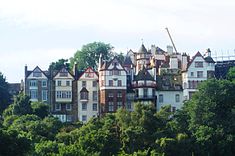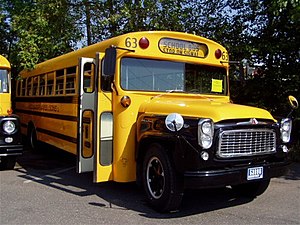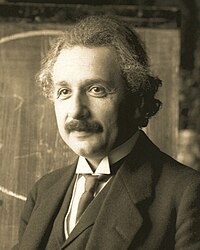English for B2 Students/Print version
Introduction to English for B2 students
This book will be a text book designed for use by learners of English as a second language. It will be primarily aimed at B2 students. B2 denotes the 4th (of 6) stage of the Common European Framework, an internationally used standard for learning languages. This level is often referred to as Upper Intermediate or Pre-Advanced and students at this level often take the University of Cambridge FCE examination. For more information about CEF levels see here
This text book will be similar to many paper text books currently available such as English File, Inside Out and Language to Go. It will present topics in a step-by-step pattern focusing on key vocabulary, grammar, writing skills, spoken interaction and communication, listening skills and examination practice in preparation for the FCE examination. The book will emphasise the use of everyday English and use standards of English which are familiar to speakers of English around the world - basically this means that vocabulary and grammar of British/Irish and American English may be used although the emphasis will often be directed to the 'easier' standard or the standard that is considered most acceptable for the University of Cambridge examinations.
Contents of English for B2 students
This book focuses on using English in everyday situations. Each unit of the book specialises in a particular part of grammar and a vocabulary topic. Units in this book make use of a variety of reading and listening texts. Each unit ends with practice exercises which should be attempted before the next unit is attempted. At the end of every 5 units there is a 'progress test' which revises grammar and vocabulary taught in the previous units. This book is designed to be read from start to finish however students may prefer to concentrate on a particular area of grammar or vocabulary. Please see the Aims page for detailed information about the contents of each unit.
The English language
The flags on the Contents page display countries where English is the main, or one of the main, language(s). The flags, from left to right, represent the following countries: The United Kingdom (original country of the English language), USA (largest English-speaking country), Canada (first language with French), South Africa (one of more than 10 official languages), Jamaica, Australia (largest English-speaking country in the southern hemisphere), Ireland, New Zealand.
As a native language English is spoken by over 350 million people but if all English speakers are included in this figure it totals well over a billion people across the globe. English is the language of business, one of the most common languages for music and films and one of the official languages of the United Nations and the European Union.
Aims of the units
Aims of the units of English for B2 students


| Unit | Grammar | Vocabulary |
|---|---|---|
| Unit 1 | adjectives and prepositions | common questions and answers |
| Unit 2 | present continuous | hobbies and sport |
| Unit 3 | present perfect | hobbies and family |
| Unit 4 | 1st, 2nd and 3rd conditionals | travel and transport |
| Unit 5 | future forms | talking about the future |
| Unit 6 | used to, usually | school, subjects |
| Unit 7 | phrasal verbs - form | phrasal verbs with look and take |
| Unit 8 | past perfect | movies, cinema |
| Unit 9 | verb patterns (infinitive, gerund) | jobs |
| Unit 10 | modals of obligation | accommodation |
| Unit 11 | adjective order and 'strong' adjectives | clothes, fashion |
| Unit 12 | passive voice | |
Unit 1 - The World of English
The World of English
Aim of this lesson: Practice some common questions and their replies and familiarise yourself with common adjectives and their dependent prepositions.
![]() listen
listen
Grammar Focus - Answering Questions
It is often difficult in English to know which tense to use when having a conversation with somebody. We often don't have time to think about the uses of each tense and then make a decision. Look again at the questions at the start of this unit. What tenses are the questions in? Now look at the answers given - what tenses are they in?
Responding to questions
- Where are you from? Present Simple
- I am from Ireland. Present Simple
- What countries have you visited? Present Perfect
- What languages did you study at school? "Past Tense"
- I have visited France, Italy and Poland. Present Perfect
When speaking with someone it is important to listen to the question as this will help you phrase your answer. We generally use the same tense in our reply as in the question.
Vocabulary Focus - Adjectives with Prepositions

- I am interested in ancient history
Is it possible to say 'I am interested at...?' or 'I am interested on...?
Many adjectives are used with specific prepositions. It is important to learn many of the most common adjective + preposition pairs as this will make you sound much more natural.
Adjectives + Prepositions
Speaking about yourself
Now that you've studied the grammar and vocabulary above you should practice answering these questions. Remember to listen to (or read) the questions carefully as this will help you phrase your answer.
- What are you interested in?
- What language do you want to learn?
- What do you worry about?
- What are you scared of?
- What do you want to eat?
Exercises
Try these questions to see if you can answer these questions and use adjectives correctly.
Complete the following sentences using the correct preposition:
- My sister's afraid ..... spiders and I'm scared ..... dogs.
| Answer |
|---|
| My sister's afraid of spiders and I'm scared of dogs. |
This is the lesson page - the answers are not to be inserted here, but to be found here
Unit 2 - I am learning English for travel
I am learning English for travel
Aim of this lesson: Revise and practice the present continuous (progressive) and learn vocabulary related to sports and hobbies.
Dialogue
Richard is travelling to school with his son Michael.
(listen)
| Richard | Look at the children, Michael. What are they doing? |
|---|---|
| Michael | They're playing football, Daddy. The boys are kicking the ball and the girls are watching them play. |
| Richard | And what about the older boys over there? What are they doing? |
| Michael | They're walking the dog and talking on their mobile phones. Dad, can I have a mobile phone? |
| Richard | Er, ask your mother, Michael. And what is that old lady doing? |
| Michael | She's waiting for a bus. |
| Richard | And what are we doing? |
| Michael | We're driving to school. |
Grammar Focus - Present Continuous

The Present Continuous is commonly used to talk about current present actions - things happening at this moment.
Vocabulary - Sports & Hobbies
When we want to talk about doing a hobby we often have a choice of verbs we can use. This table shows the appropriate verb to use with different sports. Basically we use play with ball sports, do with exercises and martial arts (Asian sports like judo and karate) and go with sports that end with ing like swimming.
Speaking about Hobbies
Work with a partner, if you can, and ask/answer these questions. If you're on your own you should think about these questions and write your answers instead.
- What sports and activities do you do regularly? How often do you practice?
- What sport are you playing or watching next week?
- How do you feel when you are playing this sport?
- What sports do you hate playing or watching?
- Do you have a favourite football team? Have you ever seen them play?
Exercises
Try these questions to see if you can use present continuous and present simple correctly. The answers can be found here.
Complete the following sentences using the present simple or present continuous:
- Look at that bad man! He ________ (smoke) a cigarette on the bus.
- I _________ (study) for my exam at the moment.
- Do you have any children? Yes, I __________ (have) two sons.
- What are you doing tomorrow evening? I _________ (meet) my wife for dinner.
- Are you busy? Yes, I ________ (take) a shower.
Grammar Reference
For further information about present continuous and present simple see Tenses and Forms.
Vocabulary Reference
For an excellent list of sports vocabulary in English complete with pictures see Learning with Pictures - Sports on the Learning English Online website.
Unit 3 - I've visited Venice
I've visited Venice
Aim of this lesson: Talk about hobbies and your family and practice using the present perfect to talk about experiences.
Chloe and Michael are students at university in Manchester. They're talking about places that they went to in the past.
Dialogue

(listen)
| Chloe | Have you ever been to Venice? |
|---|---|
| Michael | No, I've never been there. What's it like? |
| Chloe | It was great, but I went there with my aunt and cousins so I didn't have a lot of free time. |
| Michael | Did you go on a gondola? |
| Chloe | No, but I wanted to! Where have you been that was exciting? |
| Michael | I've been to South Africa. In South Africa we went sailing, which was fantastic. |
Grammar Focus - Present Perfect
- I have visited Venice.
Do we know when I visited Venice? Do we know how many times I visited Venice?
The Present Perfect is a very commonly used form in English. It is very important to learn how this form is used.
Present Perfect
Vocabulary - Family
The picture of Frodo Baggins' family tree (from the Lord of the Rings films) shows his family.
Speaking Practice
Try to practice asking and answering these questions in pairs. If you're working on your own then write your answers.
- How big is your family? Do you have many brothers, sisters, aunts, or uncles?
- Have you ever been on vacation with your family? Did you like it?
- Have you ever been to see a film at the cinema more than once? When? What film was it?
- Whom are you closest to in your family? How often do you see that person?
Exercises
Try these questions to see if you can use the present perfect correctly. The answers can be found here.
Complete the following sentences using the present perfect or past simple:
- Have you ever eaten / Did you ever eat curry?
- Last year I went / have been to Poland.
- No, I have never seen / never have seen The Lord of the Rings.
- My brother says that he haven't eaten / hasn't eaten curry.
- Did you go on vacation last summer? Yes, I have been / went to Croatia.
Grammar Reference
For further information about present perfect and past simple see Tenses and Forms.
This is the test page - the answers are not to be inserted here, but to be found here
Unit 4 - If I had €1,000,000, I would live in Spain
If I had €1,000,000, I would live in Spain
Aim of this lesson: Recognize and use the different conditionals in English and revise means of transport.
Speaking Questions
Talk about these questions with a partner. Try to expand your answers and give reasons rather than short answers.
- Where did you go on your last holiday? How did you travel? Whom did you go with?
- What is your perfect holiday destination?
- Do you prefer beach holidays, city breaks, resorts or adventure holidays?
- Do you pack a lot of things or just the basics like clothes and money?
- What are the 5 most important tourist places in your country?
Grammar Focus - 1st, 2nd and 3rd conditionals
Conditional sentences are used to talk about possible situations and the result of those situations.

Vocabulary - Travel & Transport
Look at the table below. Do you know the correct definitions for these types of transport? Click on the text for the correct answers.
Speaking with conditional sentences
Work with a partner, if you can, and ask/answer these questions. If you're on your own you should think about these questions and write your answers instead.
- How long would it have taken you to get here if you had walked?
- How will you get to work if it rains tomorrow?
- If you were going to take a vacation, where would you go?
- If you could drive any car you wanted, what would it be?
- If you had gone to London on holiday last year, what would you have done?
Exercises
Try these questions to see if you can use 1st, 2nd and 3rd conditionals correctly. The answers can be found here.
Complete the following sentences using the correct conditional form:
- If I were very rich, I _______________ in 5 star hotels (stay).
- If I _______________ (go out) on Saturday, I will drink red wine.
- If I hadn't woken up this morning, I _______________ about conditionals (not learn).
- If I could choose any wife, I _______________ Shakira (choose).
- I _______________ (buy) a new DVD if I get paid this week.
Grammar Reference
For further information about conditional sentences see Tenses and Forms.
Unit 5 - I'm going to Athens in the summer
I'm going to Athens in the summer
Aim of this lesson: Learn the various ways to talk about the future in English.
Chloe and Michael are students at university in Manchester. They're talking about their plans for the weekend and the summer.
Dialogue
(listen)
| Chloe | Hey Michael! |
|---|---|
| Michael | Hi, Chloe. How are you doing? |
| Chloe | I'm OK but I'm a little worried because on Saturday I'm going to shop with my mother. |
| Michael | Isn't that a good thing? I thought that girls liked shopping. |
| Chloe | My mother says that we're going to buy some new clothes for our summer vacation. I don't like shopping with her. What are you doing in the summer, Michael? |
| Michael | I think I'll go to summer camp in Cyprus. |
Grammar Focus - Future Forms

There are many ways to talk about the future in English.
- Generally going to and present continuous are interchangeable but if you use present continuous you must say when the event is happening.
- Present simple is not commonly used in English to talk about the future except in cases like school subjects, cinema times, and train and bus times.
- In spoken English the phrase 'going to' is normally contracted and pronounced as 'gonna'.
Speaking about the future
Work with a partner, if you can, and ask/answer these questions. If you're on your own you should think about these questions and write your answers instead.
- What are you doing at the weekend?
- If the weather's hot tomorrow, what will you do?
- Who do you think will win the next World Cup?
- Are you going on holiday this summer?
- If a friend needs money, will you lend them some?
Exercises
Try these questions to see if you can use future forms correctly. The answers can be found here.
Complete the following sentences using the correct future form:
- I've just been to the travel agents, on Saturday I'll go / I'm going to London.
- According to the timetable, the next bus will arrive / arrives at 10:05.
- I think that Manchester United will win / are going to win the match.
- It's getting very cold. Will you / Are you going to close the window?
- On Sunday I will visit / am going to visit my grandmother.
Grammar Reference
For further information about future forms see Tenses and Forms.
Unit 6 - I used to be a student
I used to be a student
Aim of this lesson: learn how to talk about past states and habits which are no longer true and learn vocabulary related to schools and school subjects.
Dialogue

Read the following dialogue then practice it with a partner if possible. Does John live in Nottingham? Does John play football?
John is meeting Mr. Roberts for a job interview in Manchester.
(listen)
| John | What would you like to know, sir? |
|---|---|
| Mr. Roberts | Could you tell me about your hobbies and what you do in your free time? |
| John | When I was younger I used to play football every week. I even played for my local team. Unfortunately, I don't have time to play any more. When I have the time I usually go to the theatre, play tennis or walk in the countryside. |
| Mr. Roberts | Do you drive? |
| John | I can drive but I don't have a car any more. I don't need one because I always use the bus. |
| Mr. Roberts | Have you always lived in Manchester? |
| John | I didn't use to live in Manchester. I used to live in Nottingham but I moved here to find work. |
| Mr. Roberts | OK thank you John. I will contact you in the next few days. |
Grammar Focus - Used to, No longer, Usually
Vocabulary Focus - School
Speaking about School
Try asking and answering these questions in pairs. If you're working alone then write down your answers. Remember that if you're still studying you should answer using the present simple. If you've finished studying then you should answer using the past simple or with used to.
- What is/was your favourite school subject?
- What subjects are/were you good at?
- What subject or sport did you use to be good at?
- Who is/was your favourite and worst school teacher? Why?
- Do/Did you like school? Why?
Exercises
Try these questions to see if you can answer these questions and use this lesson's grammar correctly. The answers can be found here.
Complete the following sentences using used to, usually or no longer:
- Do you play football? I ______ play but now I have no free time.
- Every weekend I meet my friends and we ______ go to the cinema.
- I _____ live in Germany. I love living in Spain.
- What do you ______ do at the weekend?
- I'm sad because I ______ have the time to meet my friends for a drink.
Grammar Reference
For further information about used to and usually see Tenses and Forms.
Progress Test 1
English for B2 Students/Unit 1 to 6 Progress Test
Unit 1 to 6 Progress Test
Progress Test for Units 1 to 6
Try these exercises without consulting the previous units. For answers click here. (Please write your answers on a printout, don't edit them into this page.) Good luck!!
Grammar
Complete the following sentences using the most appropriate verb form:
Today has been a very long day so far. I ______ (travel) over 100 kilometres to visit my Auntie. Thankfully, now I _______ (rest) and ______ (eat) dinner before I continue with my journey. Tomorrow will also be a long day. I have to wake up at 6am because my train ______ (leave) at 7am. Then later I ______ (have) lunch with my Auntie. I love visiting my Auntie and have very happy memories. When I was a child we ________ (go) there every summer for two weeks but unfortunately I don't have time to visit as often nowadays.
Vocabulary
Complete these sentences:
- Are you scared _____ anything?
- Have you ever ___ (=practiced) __ judo or karate?
- How many years has your auntie been married ___ your _____ ?
- Have you ever been _____ America?
- Have you ever taken your car on a _____ [boat which carries vehicles]?
- If you had €1,000,000, what ____ you buy?
- Where are you going _____ holiday this summer?
- When you were at school did you ever(= skip it) _____ _____ [not go to school because you didn't want to]?
Unit 8 - The film had already started when we arrived
The film had already started when we arrived
Aim of this lesson: Learn about and use the Past Perfect and understand the difference between the tense and Past Simple. Vocabulary that will be taught is related to cinema.
Speaking about films
Work with a partner, if you can, and ask/answer these questions. If you're on your own you should think about these questions and write your answers instead.
- What's your favourite kind of film?
- What films have you seen this year?
- Who is your favourite male or female actor?
- What's the best film you've ever seen?
- Do you prefer watching films at home or at the cinema?
Grammar - Past Perfect
Past perfect is used in English to indicate that an event occurred before another past event.

Further examples of past simple and past perfect
- How many hours had you slept for when your alarm clock went off this morning?
- My mother was angry because I had crashed her car.
- She didn't realise that she had forgotten her credit card until she got to the cash machine.
- I had only walked 100 metres when it started raining.
Vocabulary - Entertainment
Look at the table below. Do you know the correct definitions for this vocabulary related to cinema? Click on the 'show' button on the right for the correct answers.
Exercises
Try these questions to see if you know how to use past simple and past perfect correctly. The answers can be found here.
Complete the following sentences using the verb in brackets in the correct form:
- The burglars ____________ (escape) when the police __________ (arrive).
- When she __________ (arrive), the party ____________ (finish).
- When they __________ (get) to the hospital, she __________ (give) birth.
- Before we __________ (come) to London, we __________ (live) in 10 different cities.
- He __________ (be) on a plane, so he __________ (be) tired.
Grammar Reference
For further information about using past perfect and past simple see Tenses and Forms.
Unit 9 - I want to be a scientist
I want to be a scientist
Aim of this lesson: Identify and use verb patterns. Verb patterns describe the form of verb which follows the first verb. The second verb can be in the infinitive, gerund or bare infinitive (without 'to'). Also you will learn to talk about jobs: job titles and routines.
Speaking about jobs
Work with a partner, if you can, and ask/answer these questions. If you're on your own you should think about these questions and write your answers instead.
- Do you work or study?
- How long have you been working / studying? (note. use the Present Perfect when answering this question)
- What job did you want to do when you were 10 years old?
- Are there any jobs you would hate doing? Why? (note. use the 2nd Conditional when answering this question)
- In your job, what do you enjoy doing?
Grammar - Verb Patterns
In English when we use two verbs together we have to decide what form the second verb should take. We can choose between infinitive (to eat), gerund (eating) or infinitive without to (eat). The form of the second verb depends on the first verb. This table shows some common verbs and the form that the second verb should take.

Examples of Verb Patterns
- Roger suggested going to the cinema (suggest + ing)
- What do you want to eat? (want + infinitive)
- I'm sorry but I must go now. (must + infinitive without 'to')
- She hates swimming at 12:00pm ( hate + ing )
Vocabulary - Jobs
Look at the table below. Do you know the correct definitions for these jobs? Click on the 'show' button on the right for the correct answers.
Exercises
Try these questions to see if you know your verb patterns and vocabulary about jobs. The answers can be found here.
Complete the following sentences using the correct modal verb:
- When I am older I would like to live / living in the USA.
- Have you decided what to buy / buying / buy yet?
- It's a secret. You mustn't to tell / telling / tell anybody!
- I suggest to go / going / go to the seaside at the weekend.
- Please don't forget to close / closing / close the window before you leave.
Grammar Reference
For further information about verb patterns and the use of infinitive, gerund or bare infinitive see Using Verbs Together.
Unit 10 - You mustn't smoke in here
You mustn't smoke in here
Aim of this lesson: Introduce and practice modals of deduction and use some language related to hotels and other accommodation.
Sally is a tourist and she's visiting Dublin for a few days. She has just arrived at the Victoria Hotel.
Dialogue
(listen)
| Sally | Hello, my name's Sally, and I have a room reserved for tonight. |
|---|---|
| Receptionist | Hello, Sally. Welcome to the Victoria Hotel. Can I have your passport please? |
| Sally | Here you are. |
| Receptionist | OK. It'll be €55.00 for the night. Your room number is 405 and it's on the fourth floor near the lift. |
| Sally | Great, thanks. Can someone help me with my bags, please? |
| Receptionist | Certainly. Roger, our porter, will show you to your room. |
| Next Dialogue | |
| Roger | Here's your room. Is this OK for you? |
| Sally | Yes, it looks fine. |
| Roger | There are some hotel rules which I must tell you about. Firstly, you mustn't smoke in the room and you mustn't make a lot of noise after 10pm. Also you have to vacate the room before 10am. |
| Herr Schwarz | OK, that's not a problem. Are non-guests allowed in the hotel rooms? |
| Franz | Yes, but they have to leave before 10pm. Enjoy your stay at the Victoria Hotel. Good evening. |
Grammar Focus - Modals of Obligation

Modals of obligation are used to talk about permission and prohibition.
| Modal verb | Explanation | |||||||||||||||||||||||||||
|---|---|---|---|---|---|---|---|---|---|---|---|---|---|---|---|---|---|---|---|---|---|---|---|---|---|---|---|---|
| must | obligations (often personal obligations) | |||||||||||||||||||||||||||
| mustn't | prohibited, forbidden | |||||||||||||||||||||||||||
| have to | obligations (often external obligations) | |||||||||||||||||||||||||||
| don't have to | not required, optional | |||||||||||||||||||||||||||
| should | recommended, advised | |||||||||||||||||||||||||||
| shouldn't | not recommended, not advised | |||||||||||||||||||||||||||
| ||||||||||||||||||||||||||||
| ||||||||||||||||||||||||||||
| ||||||||||||||||||||||||||||
| ||||||||||||||||||||||||||||
| ||||||||||||||||||||||||||||
Speaking about Rules
Work with a partner if possible to answer these questions.
- Does your workplace or school have many rules? What mustn't you do?
- Can you think of any rules in your local café or shop? What things must or mustn't you do?
- In some countries like Australia you have to vote in elections. Do you think this is a good idea?
Vocabulary - Hotels & Accommodation
Exercises
Try these questions to see if you can use modal verbs correctly. The answers can be found here.
Complete the following sentences using the correct modal verb:
- I'm very sorry but you mustn't / don't have to smoke here.
- Sir, you have to / must leave your passport at the reception.
- My doctor says that I shouldn't / should smoke.
- The bus was cancelled so we had to / must take a taxi.
- I mustn't / don't have to go to work on Saturday because the office is closed.
Grammar Reference
For further information about the use of modals of obligation see Modal Verb on Wikipedia.
{{print entry|Unit 11|Unit 11 - Mary is wearing a beautiful, old dress]] {{print entry|Unit 12|Unit 12 - Rome wasn't built in a day}]
Progress Test 2
English for B2 Students/Unit 7 to 12 Progress Test
Grammar
English for B2 Students/FCE Grammar Reference
Vocabulary Extra
English for B2 Students/Vocabulary Extra
Further Reading Practice
What should you read in English?
By this stage you should be able to understand the main idea and key words of many articles. You will still have difficulty recognising and using many words but you should not let this prevent you from attempting to read in English. The following newspapers can be read online. Newspapers like The Guardian are considered to be broadsheet newspapers and articles are usually longer and may use more formal vocabulary. Newspapers like The Sun are tabloid newspapers and their articles are often shorter, with more pictures but they may use very informal language, idioms and phrasal verbs which may be a challenge for non-native speakers to read. English varies around the world so you should try to read articles from many different countries
- Guardian Online (British)
- The Independent (British)
- The Sun (British)
- Cape Times (South African)
- Strait Times (Singaporean)
- Washington Post (American)
Answers to exercises and tests
Answers to exercises and tests
Unit 1 Answers
- of, of
- TBC
- TBC
- TBC
Unit 2 Answers
- is smoking
- am studying
- have - use present simple to describe possession
- am meeting - use present continuous to describe future arrangements
- am having - have here describes an action so we use present continuous
Unit 3 Answers
- Have you ever eaten - we use present perfect because we mean at any time in your life
- went - we use past simple because we know when it happened: last year
- have never seen
- hasn't eaten - don't forget the third person s with he and she
- went - we use past simple because the question tells us when: last summer
Unit 4 Answers
- If I were very rich, I would stay in 5 star hotels.
- If I go out on Saturday, I will drink red wine.
- If I hadn't woken up this morning, I wouldn't have learned about conditionals.
- If I could choose any wife, I would choose Shakira.
- I will buy a new DVD if I get paid this week.
Unit 5 Answers
- I'm going - we use going to because it is a plan
- arrives - we can use present simple when talking about timetabled events
- will win - we usually use will to talk about predictions
- will you - for questions about unplanned events use will
- am going to visit
Unit 6 Answers
- used to
- usually
- used to or no longer
- usually
- no longer
Unit 7 Answers
Unit 8 Answers
- The burglars had escaped when the police arrived.
- When she arrived the party had finished.
- When they got to the hospital she had given birth.
- Before we came to London we had lived in 10 different cities.
- He had been on a plane so he was tired.
Unit 9 Answers
- to live
- to buy
- tell
- going
- to close
Unit 10 Answers
- I'm very sorry but you mustn't smoke here.
- Sir, you have to leave your passport at the reception.
- My doctor says that I shouldn't smoke.
- The bus was cancelled so we had to take the taxi.
- I don't have to go to work on Saturday because the office is closed.
Unit 11 Answers
- beautiful new striped
- long curly black
Unit 12 Answers
Test 1 Answers
Grammar
- have travelled
- am resting
- [am] eating
- leaves
- will have
- went
Vocabulary
- of
- done
- uncle
- to
- ferry
- would
- on
- play truant
Test 2 Answers
Links
Links to related web resources:
- About the Cambridge FCE Exam
- Language Exchange Community--Practise your learning language with native speakers
- RoPeCast - A biweekly podcast for advanced learners of English. Culture, Language, Learning tips.
- Common European Framework levels
- Games Zone - Online English Games